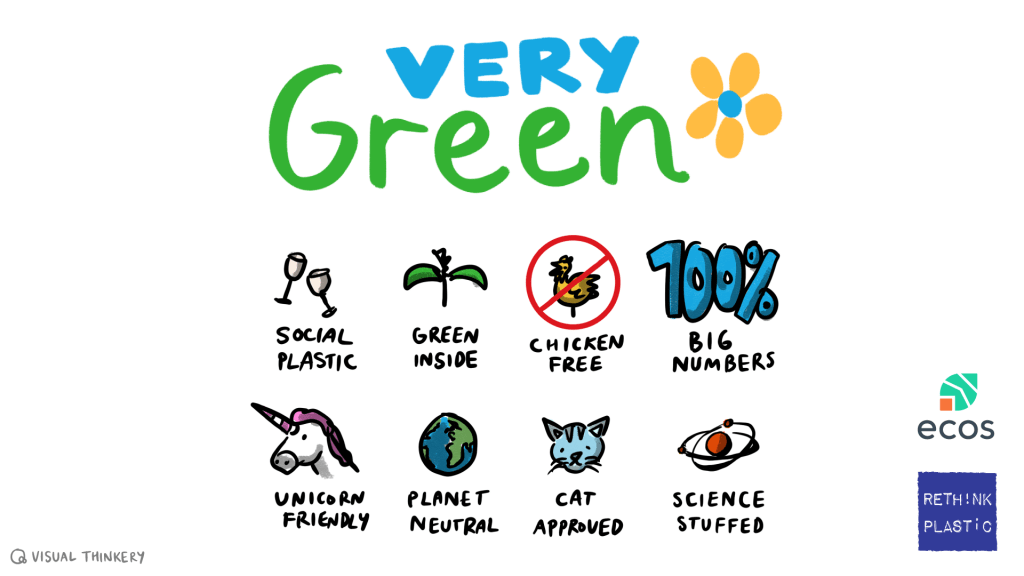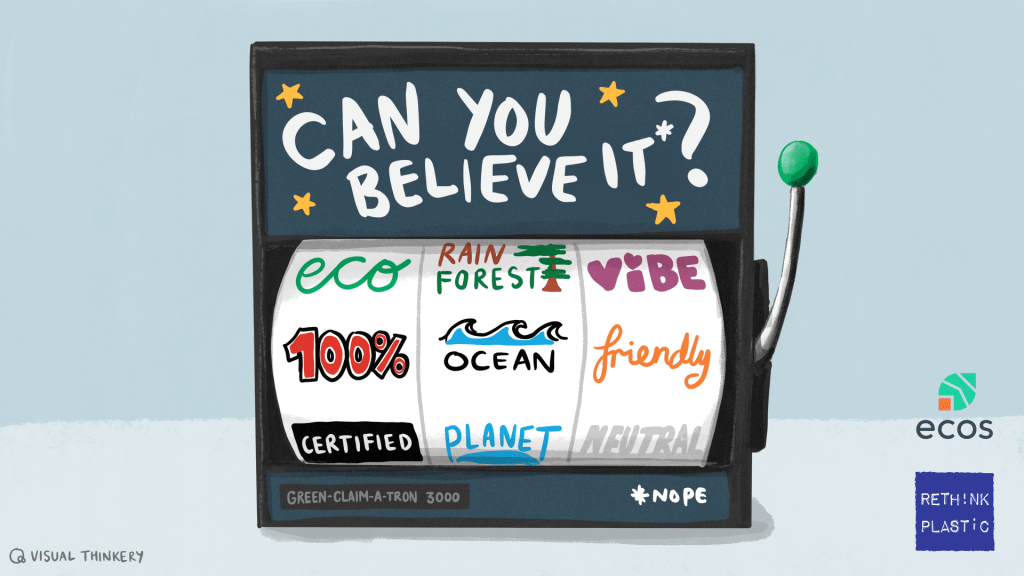Nearly half of ‘green’ claims on plastic products could be misleading – A study of green claims on plastic products
Analysts from ECOS and the Rethink Plastic alliance have examined the claims made on 82 plastic items. Products studied include some of the most commonly found on beaches across Europe such as plastic bottles, bags and cutlery.
In the absence of clear, specific legislation on ‘green’ claims, companies are free to use vague language, which can often be confusing and potentially mislead consumers. A stroll to any local supermarket is enough for anyone to find a myriad of ‘green’ claims on plastic products, then often found washed up on beaches.
Many of those statements are irrelevant to addressing the plastic crisis or supported by weak evidence, as shown in a study conducted by ECOS and the Rethink Plastic alliance on the ‘green’ claims displayed on 82 different products containing plastics or plastic packaging [1].
Main study results:
- 75% of the claims examined were self-made and not verified by independent third parties
- 49% were potentially unclear to consumers as they did not provide sufficient information
- 46% were irrelevant to addressing plastic pollution
- 26% lacked supporting evidence and were therefore considered not reliable

Most claims found in the assessment related to the following characteristics of plastic products: reusable, recyclable, containing recycled material, biodegradable, compostable, and bio-based.
Analysts highlighted some of the worst examples they found:
– ‘Reusable’ dishware: Cheap plastic glasses, cups, plates and silverware are sold as ‘reusable’ in supermarkets. This is due to the absence of clear standards on what can be referred to as reusable. Analysts concluded that clear definitions and criteria on what makes plastic items reusable are missing and needed.
– Biodegradable bottles: A common false solution doing more harm than good to the environment. Beverage bottles are already widely recycled, and it is preferable for bottles to be produced from recyclable materials rather than promoting biodegradability. Advertising biodegradable bottles is environmentally counterproductive and irrelevant.
– Biodegradable clothing: Products claiming to be biodegradable in landfill conditions. Such products, however, only incentivise the take-make-waste consumption models.
The full report can be found here: ‘Too good to be true? A study of green claims on plastic products’

Recommendations to policymakers
Greenwashing can be dramatically reduced if policymakers act. The study offers four recommendations to policymakers and standardisation organisations to put an end to unreliable ‘green’ claims:
1. Eliminate all loose and stretchable definitions in legislation and standards
2. Set clear rules in legislation about what can and what cannot be claimed
3. Strengthen enforcement of legislation and sanctions against greenwashing
4. Make sustainable products the norm
Mathilde Crêpy, senior programme manager at ECOS, said:
‘Companies should innovate real product solutions and give people honest information. During this analysis, we have found lots of false solutions and gadget innovation where brands tell consumers they are acting to solve our environmental problems when they are not. We will not solve the plastic pollution crisis with artificial green labels.’
Justine Maillot, policy coordinator of the Rethink Plastic alliance, said
‘EU decision-makers must act promptly to put an end to the harmful and ever-increasing wave of unregulated green claims, and hold companies accountable. Prohibiting unreliable, irrelevant and confusing information is a key component in allowing consumers to make informed choices, and to actually prevent plastic pollution and achieve a truly circular economy.’
Realising Reuse – Methodology
Circular Economy Portugal’s study on making the case for packaging reuse systems forms the basis for the Rethink Plastic alliance and Break Free From Plastic’s Realising Reuse report. Its methodology outlines the research and literature review, products groups proiritization, quantitative analysis, environmental assessment, scale up potential in Europe and study limitations.
Realising Reuse Report
Based on a study conducted by Circular Economy Portugal, the Realising Reuse report highlights the capacity for reuse to thrive with the right sector specific targets, policy frameworks, contributing significantly to circular economy and Paris Agreement objectives, while saving companies and consumers money.
Assessment of European countries’ transposition of the Single Use Plastics Directive
#WeChooseReuse: Waste Trade and the importance of moving from single-use plastic to reuse
Levels of plastic production, consumption and use are hugely damaging. Reuse measures will enable their reduction, writes Lauren Weir, Ocean Campaigner at the Environmental Investigation Agency.